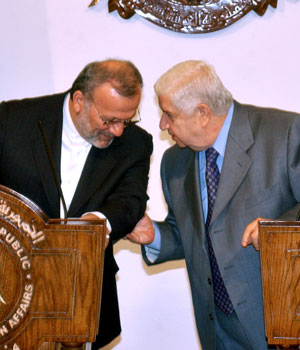
Syrian Foreign Minister Walid al-Moallem, right, and his Iranian counterpart Manouchehr Mottaki, left, confer during a joint press conference held in Damascus, May 18, 2006 (AP)
UNITED NATIONS (AFP) – The UN Security Council cranked up the pressure on Syria to agree to formal diplomatic ties with Lebanon and to demarcate their common border to allow for its smaller neighbor’s full independence.
The council voted 13 in favor, with two abstentions, for a resolution that “strongly encourages” Damascus to heed Lebanon’s request “to delineate their common border, especially in areas where the border is uncertain and to establish full diplomatic relations and representation.”
Syria immediately dismissed the text as “interference”, saying it constitutes “unwarranted pressure and a provocation which complicates things rather than resolves them.”
Russia and China abstained, arguing there was no need for such a resolution since Beirut and Damascus were already making progress in their dialogue.
But US Ambassador John Bolton welcomed the resolution as “a clear message” to Damascus that it needs to comply with Beirut’s request and as “another important step forward” in the implementation of Security Council resolution 1559 adopted in 2004.
Bolton said Damascus should also do more to stop the flow of weapons across the Syrian-Lebanese border and added that “the disarming of all militias inside Lebanon is an important priority.”
He stressed that although there was no time frame for Syria to comply, “We want to accomplish this expeditiously.”
In highlighting the need for demarcation “where the border is uncertain”, the resolution was referring to the disputed Shebaa Farms area, a small mountainous territory at the convergence of the Lebanese-Syrian-Israeli borders.
Israel captured the area from Syria during the 1967 Arab-Israeli war, and it is now claimed by Lebanon with Damascus’s consent.
Israeli troops have retained control of the area since their withdrawal from south Lebanon in May 2000 after two decades of occupation. The United Nations regards Shebaa Farms as Syrian territory.
Wednesday’s resolution reiterated the council’s call for full implementation of all requirements of Security Council resolution 1559 and for “all concerned states and parties” to cooperate fully with Beirut toward the goal of disarming all Lebanese and non-Lebanese militias.
“All concerned states” was a veiled but clear reference not only to Syria but also to Iran and its support for Lebanon’s Shiite fundamentalist Hezbollah movement.
Resolution 1559 calls for, among other things, the withdrawal of all remaining foreign forces from Lebanon, disbanding and disarmament of all Lebanese and non-Lebanese militias and deployment of the Lebanese army throughout the country.
Syria withdrew its troops from Lebanon in 2005 after 29 years of military and political domination of its smaller neighbor, in line with resolution 1559.
The council also commended Beirut for taking measures to stop the flow of arms into Lebanese territory and urged Damascus to do the same.
It also welcomed the decision by all Lebanese parties “to disarm Palestinian militias outside refugee camps within six months”.
And it called for further efforts to disband and disarm all Lebanese and non-Lebanese militias as well as the restoration of full Lebanese government control over all Lebanese territory.
Russian Ambassador Vitaly Churkin argued that a resolution was unwarranted and that a milder, non-binding statement would have been better.
“A number of countries who voted for expressed very strong reservations about serious parts of the language of the resolution,” he said.
But France’s UN Ambassador Jean-Marc de La Sabliere said: “What we are calling for, what is the core of resolution 1559, is the independence of Lebanon.”
In a letter to the Security Council last month, Syria said the establishment of embassies was a bilateral issue between Damascus and Beirut that would be decided when warranted by diplomatic conditions.

A view of a Syrian parliamanent session in Damascus on 17 May 2006. Syria rejected as “interference” a UN Security Council resolution calling on it to establish diplomatic relations and demarcate its common border with Lebanon (AFP)

Syrian Foreign Minister Walid al-Moallem (L) with his Iranian counterpart Manouchehr Mottai, who flew in Syria as part of a regional tour which he has begun in Jordan, 18 May 2006 (EPA)
